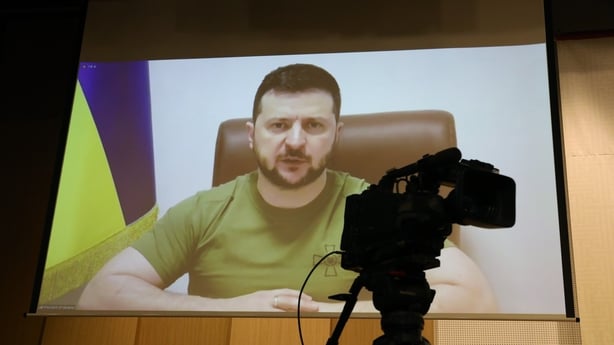Austrian Chancellor Karl Nehammer said his meeting with Russian President Vladimir Putin did not leave him optimistic after he arrived in Moscow seeking either an end to the conflict in Ukraine or humanitarian solutions for civilians there.
"I generally have no optimistic impression that I can report to you from this conversation with President Putin. The offensive (in eastern Ukraine) is evidently being prepared on a massive scale," Mr Nehammer told a news conference in Moscow after his afternoon meeting with Putin.
Mr Nehammer is the first European leader to visit the Russian president since the start of Moscow's military campaign in Ukraine.
Just over an hour after the meeting started in Mr Putin's residence in Moscow, Mr Nehammer's office sent out a statement saying that it had ended.
In the statement Mr Nehammer said the meeting was not "a visit of friendship," adding that conversation between the two men had been "direct, open and hard".
"I mentioned the serious war crimes in Bucha and other locations and stressed that all those responsible have to be brought to justice," he said.
Russia denies its forces have committed war crimes.
Kremlin spokesman Dmitry Peskov said that the Austrian side had requested the meeting be held behind closed doors.
On the topic of sanctions Mr Nehammer said he had "told President Putin very clearly that the sanctions will remain and be intensified as long as people keep dying in Ukraine".
Mr Nehammer also told Mr Putin of the "urgent" need for humanitarian corridors "to bring water and food into besieged towns and (to) remove women, children and the injured".
"I will now inform our European partners about the conversation and discuss further steps," he said.
Mr Nehammer's trip to Moscow follows a visit to Kyiv on Saturday where he held talks with Ukrainian President Volodymyr Zelensky.

Since Russia invaded, Mr Zelensky has appealed to Western powers to provide more defence help, and to punish Moscow with tougher sanctions including embargoes on its energy exports.
US national security adviser Jake Sullivan told ABC News: "We're going to get Ukraine the weapons it needs to beat back the Russians to stop them from taking more cities and towns."
Mr Zelensky said he had confidence in his own armed forces but "unfortunately I don't have the confidence that we will be receiving everything we need" from the United States.
"They have to supply weapons to Ukraine as if they were defending themselves and their own people," Mr Zelensky said in an interview aired on CBS's 60 Minutes programme.
"They need to understand this. If they don't speed up, it will be very hard for us to hold on against this pressure," he added.
Mr Zelensky said earlier on Twitter he had spoken on the phone with German Chancellor Olaf Scholz about additional sanctions, as well as more defence and financial support for his country. He also discussed with Ukrainian officials Kyiv's proposals for a new package of EU sanctions, his office said.
The EU on Friday banned Russian coal imports among other products, but has yet to touch oil and gas imports from Russia.
Mounting civilian casualties have triggered widespread international condemnation and new sanctions.
Several EU ministers said today the bloc's executive was drafting proposals for an oil embargo on Russia, although there was still no agreement to ban Russian crude.
German Foreign Minister Annalena Baerbock, speaking before a meeting of European ministers in Luxembourg, said Berlin saw "massive indications" of war crimes in Ukraine.
French bank Societe Generale became the latest company to retreat from Russia, agreeing to sell its stake in Rosbank and the Russian lender's insurance subsidiaries to Interros Capital, a firm linked to billionaire Vladimir Potanin.
The World Bank forecast the war would cause Ukraine's economic output to collapse by 45% this year, with half of its businesses shuttered, grain exports mostly cut off by Russia's naval blockade and destruction rendering economic activity impossible in many areas.
The bank forecast Russia's economy would contract by 11.2% this year due to the Western sanctions.

